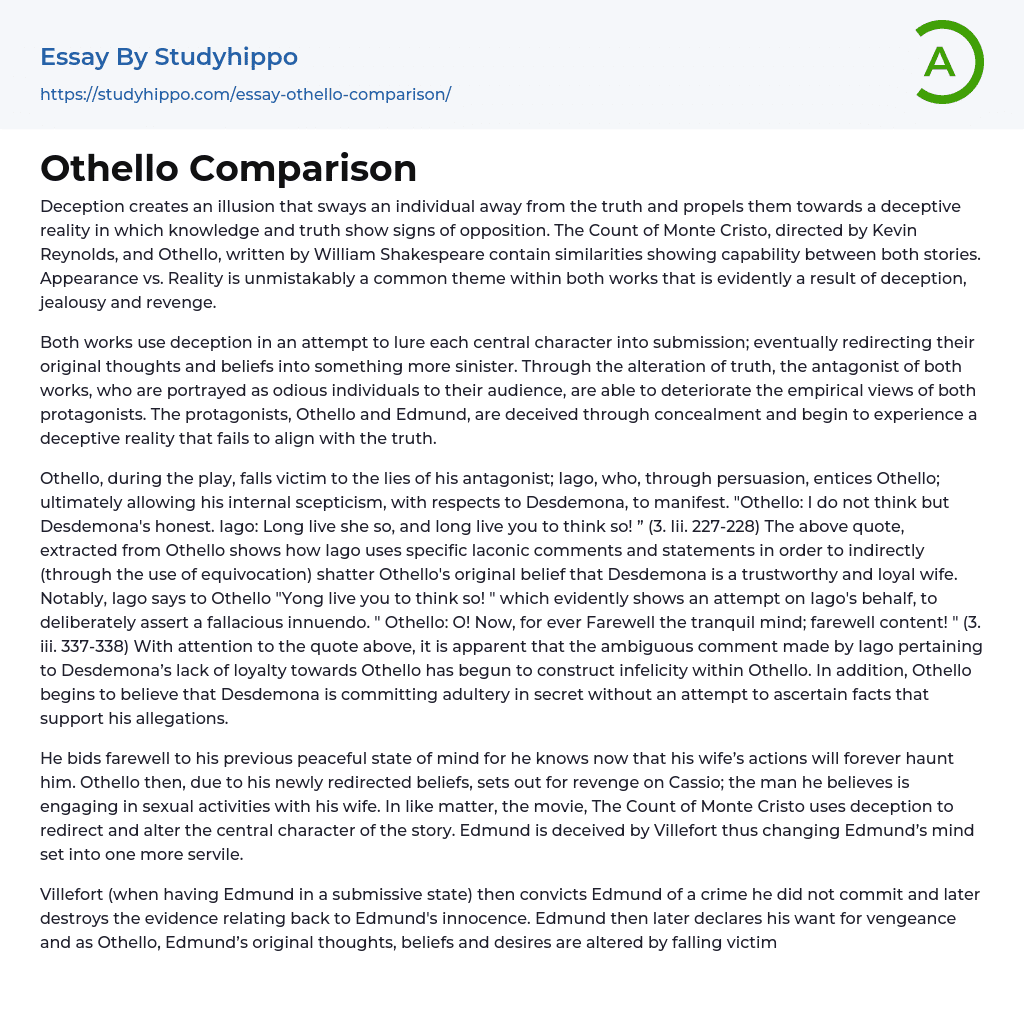Deception, the act of creating a false perception that leads to deceit and contradiction between knowledge and truth, is explored in both The Count of Monte Cristo (directed by Kevin Reynolds) and Othello (written by William Shakespeare). These narratives share the theme of Appearance vs. Reality as a result of deception, jealousy, and revenge.
Both works employ deception to manipulate and control the main characters, leading them away from their initial thoughts and beliefs. By distorting the truth, the odious antagonists in both works undermine the protagonists' objective viewpoints. Othello and Edmund, the main characters, are deceived through concealment and enter a distorted reality that differs from the truth.
Throughout the play, Othello falls prey to Iago's lies. Iago cleverly persuades Othello to doubt Desdemona's trustworthiness. One example of t
...his manipulation is seen when Iago states, "Long live she so, and long live you to think so!" (3.iii.227-228). This quote demonstrates how Iago subtly undermines Othello's belief in Desdemona as a loyal wife through brief comments. Another quote that showcases the impact of Iago's manipulation is when Othello exclaims, "Now, forever Farewell the tranquil mind; farewell content!" (3.iii.337-338). This shows that Iago's ambiguous insinuations about Desdemona's disloyalty are starting to disturb Othello. Rather than seeking evidence to support his accusations, Othello begins believing that Desdemona is secretly committing adultery.
In both Othello and The Count of Monte Cristo, the main characters experience a shift in their mindset due to deception. Othello becomes troubled by his wife's actions and seeks revenge on Cassio based on false beliefs. Similarly, Edmund in The Count of Monte Cristo is deceived by Villefort, leading t
a more submissive mindset.
Villefort, with Edmund in a submissive state, convicts him of a crime he didn't commit and destroys evidence of his innocence. This leads Edmund to desire vengeance and undergo a transformation similar to Othello. Both characters seek and find revenge, but only one is satisfied with the method used. Iago's obscure approach raises the question, "Is revenge worth it?"
Throughout the play, Iago harbors strong contempt for Othello in secret and goes to great lengths to orchestrate his downfall by continually criticizing him. The quote "Iago: I am not what I am" (1. I. 65) from Othello exemplifies how Iago arrogantly believes that Othello is unaware of his true intentions or identity. As the play progresses, Iago revels in the satisfaction of his revenge, as it ultimately results in death and the downfall of Othello. However, Iago is ultimately left with nothing as a consequence of achieving his desired revenge.
Both Edmund and Fernand sought revenge in their respective works. Edmund accomplished revenge by winning back his wife and leaving Fernand with nothing. However, Edmund's quest for revenge caused him to change as a person and renounce his belief in God, something he had valued before. The works explore the concept of revenge, one portraying its realistic outcome and the other depicting the desired conclusion sought by those seeking revenge.
Both "Othello" and The Count of Monte Cristo prominently feature the theme of jealousy. In "Othello," Iago warns about the dangers of jealousy, referring to it as a green-eyed monster that torments and consumes its victims. This emotion not only leads to the downfall of individuals but
also mercilessly mocks them. Jealousy has the ability to evoke other relatable emotions in those who fall victim to it.
The destructive power of jealousy is evident in both Othello and The Count of Monte Cristo. In Othello, the protagonist's jealousy towards Desdemona's lack of love for him becomes an all-consuming obsession that leads to her murder. Similarly, Fernand from The Count of Monte Cristo also experiences the destructive effects of jealousy. Like Othello, he fixates on the spouse of his closest friend, Edmund, and devises a plan to ruin their marriage due to his own love for Mercedes.
Both Fernand and Othello allowed jealousy to control their lives, which ultimately led to their tragic downfall. Fernand wrongfully imprisoned Edmund and lost his wife to him when Edmund gained his freedom, leaving Fernand with nothing. Othello's jealousy stemmed from his inner vanity, while Fernand's jealousy was driven by his explicit greed. Overall, both works showcase the destructive nature of jealousy and highlight the negative traits of the leading characters.
Both Othello and The Count of Monte Cristo depicted controversial themes that emphasized their similarities. These themes, including jealousy, revenge, and deception, played significant roles in driving the narratives towards their respective conclusions. However, the two works concluded their exploration of these themes in different ways, ultimately establishing Othello as a more profound tragedy when compared to The Count of Monte Cristo. In essence, both stories revolve around the theme of Appearance vs. Reality, which is fueled by jealousy, revenge, and deception.
- Othello Jealousy essays
- A Doll's House essays
- A Midsummer Night's Dream essays
- A raisin in the sun essays
- A Streetcar Named Desire essays
- An Inspector Calls essays
- Death of a salesman essays
- Everyman essays
- Fences essays
- Hamlet essays
- Hedda Gabler essays
- Iago essays
- King Lear essays
- Macbeth essays
- Much ado about nothing essays
- Oedipus Rex essays
- Oedipus The King essays
- Othello essays
- Pygmalion essays
- Romeo And Juliet essays
- Tartuffe essays
- The glass menagerie essays
- The Importance of Being Earnest essays
- The Merchant Of Venice essays
- The Taming of The Shrew essays
- Twelfth Night essays
- Waiting For Godot essays
- Absolutism essays
- Appeal essays
- Bourgeoisie essays
- Contras essays
- Corporate Governance essays
- Corruption essays
- Democracy essays
- Democratic Party essays
- Developed Country essays
- Dictatorship essays
- Elections essays
- European Union essays
- Federalism essays
- Foreign essays
- Foreign policy essays
- Gentrification essays
- Hillary Clinton essays
- Income Tax essays
- International Relations essays
- John Marshall essays
- John Stuart Mill essays
- Left-Wing Politics essays
- Liberty essays




